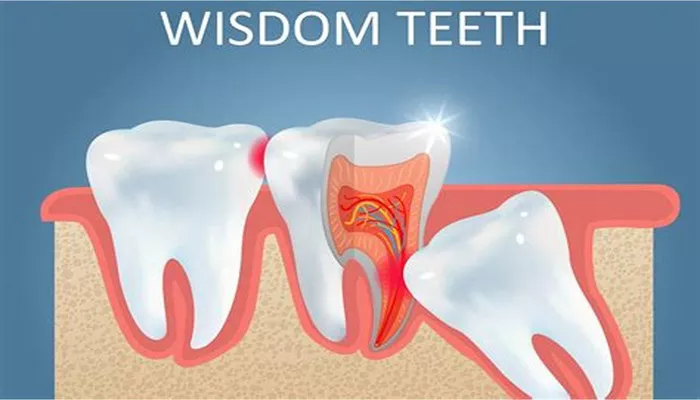When wisdom teeth, also known as third molars, begin to emerge, it is very common for the gums around them to bleed. In fact, bleeding gums is one of the most frequently reported symptoms associated with wisdom teeth coming in.
Wisdom teeth typically erupt between the ages of 17 and 25, although some people may not develop them at all. As these final molars break through the gum line, the gum tissue can become irritated, inflamed and prone to bleeding, especially when brushing or flossing in that area.
So in summary, yes, it is completely normal and expected for some bleeding to occur when wisdom teeth are growing in.
The bleeding is usually mild and temporary, resolving once the teeth have fully erupted and the gums have had time to adapt.
Causes of Bleeding Gums with Wisdom Teeth
There are a few key reasons why wisdom teeth often cause the gums to bleed:
Gum Irritation
As the wisdom teeth push through the gum tissue, it can become irritated, inflamed and sensitive. This makes the gums more prone to bleeding, especially when aggravated by brushing or flossing.
Plaque and Bacteria Buildup
It can be difficult to keep the back of the mouth clean when wisdom teeth are erupting. Food debris and plaque can accumulate, leading to bacterial growth and gum inflammation that causes bleeding.
Partial Eruption
Many wisdom teeth only partially emerge from the gums, leaving a flap of gum tissue that can trap food and plaque. This gum flap is very susceptible to bleeding.
see also: How Long Does General Anesthesia Last After Wisdom Teeth
Impaction
If the wisdom teeth are impacted, meaning they are stuck under the gum or against another tooth, it can lead to significant gum inflammation and bleeding.
Gum Injury
Biting or injuring the gums while eating can also cause bleeding, especially if the gums are already inflamed from wisdom teeth coming in.
When Is Wisdom Tooth Bleeding Abnormal?
While some bleeding is normal, there are certain situations where bleeding from wisdom teeth may be a sign of a problem:
Excessive or Prolonged Bleeding – If the bleeding is very heavy or doesn’t resolve within a week or two, it could indicate an infection or other complication.
Severe Pain – Significant, worsening pain along with the bleeding may mean the wisdom tooth is impacted or infected.
Difficulty Swallowing or Opening Mouth – These symptoms along with bleeding could be a sign of a serious infection that requires prompt treatment.
Fever – A fever along with bleeding and pain is a red flag for infection that needs medical attention.
Pus or Foul Odor – Pus, a bad taste, or foul odor coming from the wisdom tooth area combined with bleeding is a sign of infection.
If you experience any of these abnormal symptoms along with wisdom tooth bleeding, it’s important to see your dentist right away for evaluation and treatment.
Managing Normal Wisdom Tooth Bleeding
For the typical mild bleeding that occurs as wisdom teeth erupt, there are some things you can do at home to help:
Gently Brush and Floss – Continue your regular oral hygiene routine, but be extra gentle when cleaning around the wisdom teeth. Use a soft-bristled toothbrush and floss carefully.
Use a Saltwater Rinse – Rinsing your mouth with warm salt water can help reduce inflammation and promote healing. Mix 1/2 teaspoon of salt in a cup of warm water and rinse gently.
Take Over-the-Counter Pain Medication – If the area is painful, ibuprofen or acetaminophen can help relieve discomfort and reduce inflammation.
Apply a Cold Compress – Holding a cold compress or ice pack to the outside of your cheek can help constrict blood vessels and minimize bleeding.
Avoid Irritants – Steer clear of hard, crunchy, or spicy foods that could further irritate the gums. Also avoid smoking, which can delay healing.
If the bleeding persists for more than a couple weeks or is accompanied by severe pain, swelling, or other concerning symptoms, it’s best to see your dentist to rule out any complications.
Preventing Wisdom Tooth Complications
While some bleeding is normal, it’s best to prevent wisdom teeth from causing significant problems in the first place. Here are some tips:
Get Regular Dental Checkups – See your dentist every six months for exams and cleanings. They can monitor your wisdom teeth and recommend removal if needed before problems arise.
Practice Good Oral Hygiene – Brush twice daily, floss once a day, and use an antiseptic mouthwash. This helps keep plaque and bacteria under control around the wisdom teeth.
Consider Early Removal – If your wisdom teeth are causing problems like pain, infection, or crowding, your dentist may recommend having them removed, even if they haven’t fully erupted yet.
Maintain a Healthy Lifestyle – Eating a nutritious diet, staying hydrated, and avoiding smoking can support your body’s ability to fight off infections and heal quickly.
Conclution
In most cases, any bleeding or discomfort from wisdom teeth resolves on its own within a week or two. But it’s still important to maintain good oral hygiene and see your dentist regularly to prevent and manage any complications.

